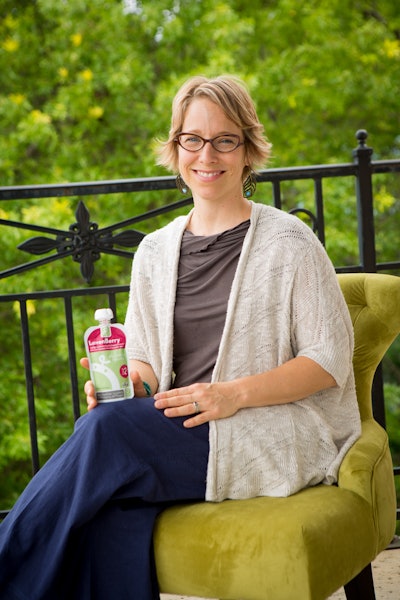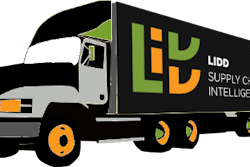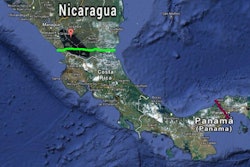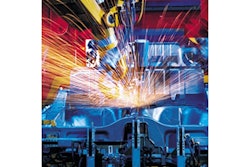
Having a baby often changes your life, but for Fran Free, the birth of her daughter, Lucy, drove her to create one of the fastest growing businesses in Northwest Arkansas: Fayetteville-based Oh Baby Foods Inc. First-time parents often say that nothing fully prepares them for having a baby. For Fran Free, who had limited funds and no business experience, the same can certainly be said for launching a company.
Visit Free and her staff at their fashionable building in downtown Fayetteville today and you’d never guess the company is less than six years old. The six-person staff goes about their business placing orders for their organic baby food with national name brand food companies like Whole Foods. Visit the graphically-appealing, highly-professional company website, and you might think Oh Baby Foods is a large company.
The company, which Entrepreneur Magazine recently cited as one of the “seven startups to watch in the South,” became profitable in its third year and is on track to do $1 million in sales this year. Oh Baby Foods sells its products in roughly 1,000 stores in 40 states.
Free credits much of her success to overcoming distribution and logistics challenges in her third year. “Food logistics has really been one of my biggest obstacles,” she says.
Humble Beginnings
Free grew up on a family farm in south Arkansas and studied environmental science and agricultural economics at the University of Arkansas in Fayetteville. She was considering opening a bed and breakfast when she became pregnant while still in graduate school.
As a mom-to-be, she began exploring infant nutrition and was surprised to learn that very few baby food products were made with products sourced in the U.S. She saw a market for baby food sourced in the U.S. that was organic, BPA-free, containing no GMOs and tasted good.
In 2009, Free sold her home and used the proceeds to begin Oh Baby Foods in her kitchen. She purchased fruit from local growers, cleaned it, pureed it, baked it, cupped it in 4-ounce containers and stored it in her freezer. She purchased a 12-foot reefer and drove to local natural food stores selling her frozen baby food by the case.
Encouraged by the results in her first few months, Free rented a 4,000-square-foot facility with a big kitchen where she was able to make larger volumes of baby food. She rented storage space in a cold warehouse, invested in processing equipment, and hired as many as 12 temporary workers to cup the frozen baby food. She added freezers, convection ovens, mixers and a pedal-controlled portioner.
Growth Brings Challenges
By year two, she had 13 retail customers – all natural food stores – and moved to a larger facility. She launched a website and began taking orders over the Internet, delivering product packaged with dry ice. The Internet project was short-lived since the sales did not come close to covering the expense.
Free also tried offering a subscription service, whereby parents placed weekly orders and either picked them up or had them delivered. The subscription service did not prove profitable either, but it allowed Free to test a variety of flavors and learn which ones were most popular with customers.
She managed to get the frozen baby food in two Whole Food stores. Whole Foods provided her a low interest loan through its Local Producer Loan Program.
It didn’t take Free long to realize why so few baby food manufacturers were sourcing fruit locally. Local fruit can be twice as expensive as imported fruit, she says, due largely to export demand. Then there was the cost of cleaning, coring, cooking and transporting. It cost her $96 to produce a 12-pack case of food that she sold for $46.
The business grew every year, but by year three, Free was still not profitable. She realized she needed a larger volume of business to achieve the economy of scale that would allow her to be profitable.
She also realized that shoppers were not accustomed to finding baby food in the frozen food section of the grocery store. By the time a parent learned that Oh Baby Foods was in the frozen food section, their child was outgrowing baby food.
“It was too time-consuming and cost-prohibitive to continually educate people about the frozen product,” she says.
In Search Of A Food Processor
To get into the baby food section in the grocery store, she needed a shelf-stable product. The only problem was there were no food processors willing to talk to her about the volume of business she had in mind.
Free persisted. She knew, based on her own research, which food processor she wanted to make her baby food. She eventually persuaded the company to produce the shelf stable food. This agreement in 2012 marked a turning point in the business. The processor produced the shelf stable food, which got packaged in 4-ounce squeeze packs. “They really held our hands through the process,” Free said. The processor helped her get the certifications she needed to label the product as 100 percent U.S. grown, organic, non-GMO and BPA-free.
When the shelf stable product was introduced to the stores, Whole Foods moved it to the baby aisle, and sales improved. Whole Foods soon introduced it to more of their stores.
But Free’s challenges weren’t over.
Logistics Challenges Arise
To expand the business, she needed the services of a natural food distributor and a refrigerated warehouse. She had not done any shelf life studies with her product, and she did not want to risk having the product stored in an ambient warehouse.
The southwest region headquarters for Whole Foods was based in Austin, Texas. The company’s distributor for this region is United Natural Foods Inc. (UNFI) which operates a distribution center in Lancaster, Texas. Free’s problem was that the UNFI warehouse is hundreds of miles from central California, where the Oh Baby Foods product is produced. Free needed to store product in a warehouse closer to the UNFI southwest distribution center.
Finding a cold storage facility near the UNFI distribution center was a challenge in itself. The other challenge was finding a 3PL to move the product from the production plant to the cold storage warehouse.
Free found a cold storage warehouse and a 3PL, but that wasn’t the end of her troubles. The two companies had trouble coordinating shipments. “It was a nightmare not having these companies working together,” she says.
The 3PL required a delivery window of two or more hours while the warehouse would not provide a delivery appointment window of less than two hours. If the 3PL missed that two-hour window, they would have to reschedule the shipment, which caused the product to arrive at the customer late. Sometimes the 3PL truck would arrive a few minutes late, but the warehouse could not squeeze them in. Sometimes the warehouse would make the 3PL driver wait too long and they’d have to reschedule.
In addition, the two companies required different sets of information on their bills of lading. They eventually worked this out, but it took several shipments before an agreed-upon format was reached.
When shipments did not make it to the distribution center on time, Free had to apologize to her customers.
Before this problem was solved, the product’s success in the baby aisle caused Whole Foods to add it to its California stores. The cold storage provider had a California warehouse to serve Whole Foods’ California stores, but the logistics problems persisted. Free’s business was growing rapidly but her deliveries were not consistent. “I never found a way to make it (the seamless communication and cooperation between the warehouse and the 3PL) happen,” she says.
A 3PL To The Rescue
Free found her answer in her own backyard. As a native of Northwest Arkansas, she learned through word of mouth about CaseStack, a Santa Monica, Calif.-based 3PL which has a regional headquarters in Fayetteville, Ark. The company provides transportation in addition to logistics and was familiar with the types of problems Free was experiencing. This past June, she signed on as a CaseStack customer, and so far, she has few complaints.
“It’s nice to have people that are right here,” Free says.
The new 3PL eliminated Free’s need to coordinate deliveries from the cold storage warehouse to the distribution center. “We have one client development manager who helps make sure our product information is correct and we have one warehouse account manager,” she says. “I don’t have to worry about them not keeping an appointment with themselves.”
The new 3PL has also reduced the number of deliveries, Free says, since the company’s trucks transport more than one manufacturer’s freight at a time. The 3PL refers to this system as “consolidation.”
The 3PL’s software allows Free to check shipments in real time over the Internet. “I love going to the website, logging in and seeing each purchase order and making sure it’s correct before it’s shipped out,” she says. “I love the accessibility and the accountability.”
Free also likes the fact that the 3PL has warehouses throughout the country in markets where she wants to expand. Since the 3PL has relationships with these retailers, Free thinks it will make it easier to work with these companies if and when she becomes a supplier to them.
“I love the fact that they have additional locations as we grow,” she says.
She credits her new 3PL for helping Oh Baby Foods expand into e-commerce through Abe’s Market and Diapers.com. The 3PL fulfills the orders for these e-commerce websites, which can be found on Oh Baby Foods’ website. “I get the peace of mind that (e-commerce) pallet types are correct,” she says.
Free has no plans to manage her own e-commerce sales. “I don’t want to handle logistics,” she says. “It’s not cost effective for us to go to FedEx and ship stuff out. I want to make and sell baby food.”
The company is presently seeking additional funding to support its rapid growth.
This spring, Whole Foods named Oh Baby Foods a national brand, opening up additional markets not previously available to the company. Oh Baby Foods is one of eight local producers to qualify for national brand status, Free said. In August, more than 250 Whole Foods stores will carry Oh Baby Foods. Free says the national chain represents 40 percent of her total sales.
The growth has allowed the company to hire a full-time analyst, an office manager and two part-time staffers. In the fall of 2014, Free hopes to name a chief executive officer and 16 other full-time employees in the next three years.
Free hopes to find a packaging material that can be recycled.
She is also working on a private label organic baby food line to launch in the spring.
A Good Place To Do Business
Free feels fortunate to have started her business in northwest Arkansas. As a graduate student at the University of Arkansas in Fayetteville, she got some help starting the business from her professors at the university.
There are also a number of businesses in the area that have expertise in retailing who have helped her. “People know retail in this area,” she says.
Now that her company is seeking additional funding, Free thinks being in northwest Arkansas is helpful since there are potential investors in the area who understand the type of business she owns. There are people in the area who understand food logistics and food manufacturing.
Free feels fortunate to have launched her baby food business in an area that gave her access to people and companies who understand food logistics, retailing and manufacturing.















